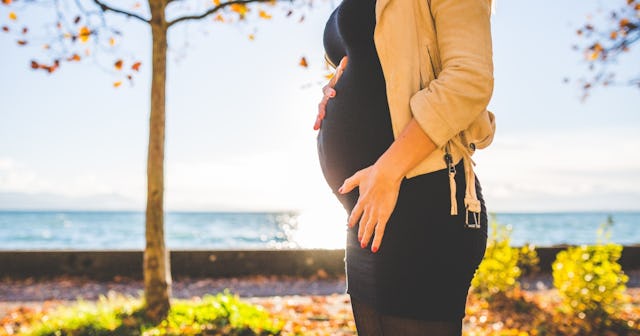How To Tell Normal And Abnormal Pelvic Pain During Pregnancy

Just because your period is on vacation doesn’t mean that you get to take a break from cramping and pelvic discomfort for nine months. This common pregnancy symptom typically appears in different ways during each trimester as your growing uterus puts pressure on your expanding joints. And while most pregnant women experience some sort of pain and pressure during their pregnancies, it’s important you don’t brush off all pain in your abdomen and know when you should contact your OB-GYN.
Ahead, everything you need to know about this symptom.
First, what is pelvic pain?
You might be wondering, What does pelvic pain feel like? Pelvic pain is any sensation happening:
- Beneath your belly button and above your legs.
- Over the pubic bone at the front in the center.
- Across one or both sides of the lower back
- In the perineum.
Pain can also radiate to the thighs, and some women feel a grinding sensation in the pelvic area (not the good kind).
RELATED: Pregnancy Skin Conditions Can Wipe The Glow And The Smile Off Your Face
Why am I experiencing pelvic pain?
There are lots of reasons why you might experience pelvic pain during your pregnancy, and it can be scary to try and figure out why it’s happening. Here are a few possible explanations.
Normal Bodily Processes
Most of the time, pelvic discomfort is caused by the normal processes that occur during pregnancy. Your body is stretching to accommodate your growing uterus and make room for shifting organs. Hormone levels are increasing, which relax ligaments and make your joints looser.
Your Expanding Uterus
From about eight to 12 weeks of pregnancy, you might experience cramping that feels like a period. Don’t worry, this is just your uterus expanding. If you have any bleeding, see your doctor; cramping with bleeding could be indicative of a problem or miscarriage.
RELATED: Pregnancy Heartburn Will Have You Breathing Fire For 9 Months Because, Why Not?
Constipation
Constipation can also be a reason for pelvic pain. If you suspect you’re just constipated, drink plenty of fluids and consume foods high in fiber, such as fruits, vegetables, and whole grains in an effort to keep things moving.
Braxton Hicks Contractions
Sometimes pelvic pain can be mistaken for Braxton Hicks contractions. If you are experiencing sporadic pressure in the pelvis, this is the most likely cause. Braxton Hicks contractions should disappear on their own; if they don’t, contact your doctor.
“Lightening”
Most women complain of pelvic pain during the third trimester. This is because your baby is settling into a deeper position in the pelvis in order to prepare for birth; this is called “dropping” or “lightning.” Lighting usually happens a few weeks before you give birth, but it can happen a few hours before labor begins. When the baby drops, it can put more pressure on your bladder, hips, and pelvis.
RELATED: Vaginal Discharge During Pregnancy: What’s Normal, What’s Not, And What To Keep In Mind
How do you relieve pelvic pain during pregnancy?
Unfortunately, there’s not too much you can do about pelvic pain. If you’re experiencing mild pelvic pain, you can try:
- Taking a lukewarm bath.
- Wearing pelvic support garments.
- Getting a prenatal massage.
- Make yourself as comfortable as possible. If you haven’t already given up on high heels, now might be the time. Don’t feel sad, though! Orthopedic flats are very cute and on-trend.
When should I call my doctor?
Because pelvic pain can be caused by so many different factors, it’s always a good idea to check with your doctor if you feel any discomfort in the pelvic region or if you have:
- Bleeding
- Fever and chills
- A severe headache or dizziness
- Swelling
- Persistent nausea or vomiting
In general, anytime you feel like something is wrong with your baby, you should call your doctor immediately.
This article was originally published on